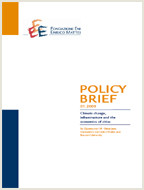Towards a cost-effective climate policy. The role of technology, timing and participation
On the road to Copenhagen, several key issues are under the spotlight. However, the success of any post-Kyoto agreement will depend on its economic acceptability. Three key factors will play a major role in determining the economic performance of any future climate treaty: energy technology development, the participation of developing countries and the timing of a global action. To reduce mitigation costs towards a climate stabilization target, FEEM research findings suggest that post-2012 climate architectures should concurrently encourage the deployment of currently available and future abatement options by means of carbon pricing and policies aimed at fostering innovation. Various options −involving international carbon offsets, technology initiatives− can be used as tools to encourage the participation of developing countries, but the eventual attainment of stringent climate stabilization will rest on a substantial global effort in terms of investment and consumption change. As a first step, the commitment to a moderate transitional target, capitalizing on existing low cost options, may increase the chances of finding an agreement in Copenhagen.

